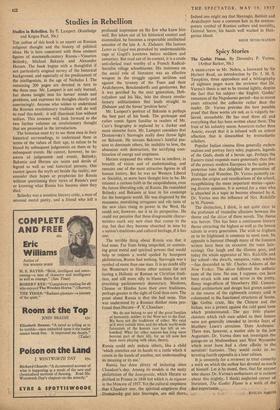Studies in Rebellion
THE author of this book is an expert on Russian religious thought and the history of political ideas. He is here concerned with three eminent figures of nineteenth-century Russia—Vissarion Belinsky, Michael Bakunin and Alexander Herzen. The book begins with a thoughtful if not particularly original survey of the historical background, and especially of the predicament of the intelligentsia, in the age of Nicholas I. The remaining 200 pages are devoted in turn to the three men. Mr. Lampert is not only learned, but shows insight into his heroes' minds and problems, and expresses his thoughts clearly and convincingly. Anyone who wishes to understand the Russian revolutionary tradition will do well to read this book : it will illuminate him without tedium. This reviewer will look forward to ,the two further volumes on revolutionary thought that are promised in the introduction.
The historian must try to see these men in their historical surroundings, to understand them in terms of the values of their age, to refuse to be biased by subsequent judgements on them or by subsequent• events. He cannot, however, be un- aware of judgements and events. Belinsky, Bakunin and Herzen are saints and devils of legend as well as real historical persons. One cannot ignore the myth set beside the reality, nor consider their hopes or prophecies for Russia without questioning their views of Russia's past or knowing what Russia has become since they died.
Belinsky was a sensitive literary critic, a man of unusual moral purity, and a friend who left a profound impression on the few who knew him well. But taken out of his historical context and mummified, he becomes a respectable intellectual
ancestor of the late A. A. Zhdanov. His famous Letter to Gogol was provoked by understandable rage at Goers kowtows before serfdom and autocracy. But read out of its context, it is a crude anti-clerical tract worthy of a French Radical- Socialist village schoolmaster. His insistence on the social role of literature was an effective
weapon in the struggle against serfdom and against the tyranny of the Tsars and their Arakcheyevs, Benckendorffs and gendarmes. But it was petrified by the next generation, Dob- rolyubov and his like, into the dreary revolu- tionary utilitarianism that leads straight to Zhdanov and the Soviet 'positive hero.'
Mr. Lampert's portrait of Bakunin is perhaps
the best part of his book. The grotesque and rather comic figure familiar to readers of Mr.
Carr's biography is replaced by a darker and more sininster form. Mr. Lampert considers that Dostoievsky's Stavrogin really does throw light on Bakunin. He stresses Bakunin's hateful pas- sion to dominate others, his inability to love, the obsession with destruction, the terrifying com- bination of energy and emptiness.
Herzen surpassed the other two in intellect, in breadth of vision and of understanding, and remains one of the most attractive figures in all human history. But he was no Western Liberal or Socialist, as some have thought him to be. He retained a curious faith in the unspoiledness, even the future liberating role, of Russia. He resembled Belinsky and Bakunin at least in his contempt for the bourgeois world. He was disgusted by the meanness, moralising arrogance and vile taste of the new class rising to power in the West. He could not, however, see it in its perspective. He could not perceive that these disagreeable charac- teristics mark any new class that comes to the top, but that they become absorbed in time by
a,nation's-traditions and cultural heritage, if it has one.
The terrible thing about Russia was.. that it had none. Far from being unspoiled, or contain- ing great moral and spiritual powers that would help to redeem a world spoiled by bourgeois philistinism, Russia had nothing. Stavrogin was a symbol of more than one man. It is no doubt silly for. Westerners to blame other nations for not having a Hellenic or Roman or Christian tradi-
tion, and still more silly to blame them for not .practising • parliamentary democracy. Moslems,
Chinese or 'Hindus have their own traditions, perhaps greater in the sight of God than ours. The point about Russia is that she had none. This was understood by a Russian thinker more pro- found than Herzen—P. Y. Chaadaev
We do not belong to any of the great families of humanity, neither to the West nor to the East. , Wi have not the traditions of either. We exist, as it were outside time, and the whole world-wide tormatitin of the human race has left us un- tobched. What for other nations has long since become part of their life, for us till now has beGn mere playing with ideas, theory.
Dostojaysky put into Stavrogin, are still there.; Russia could only imitate others, like a child `which stretches out its hands to a rattle which it covets in the hands of another, not understanding its meaning or its use.
Russia has done plenty of imitating since Chaadaev's• day. Among its models is the nasty philistinism of the bourgeoisie, which Herzen so disliked in France in 1848 but which is da,rigueur in the'Moscow of 1957. Yet the cultural emptiness , that •Cha.adaev saw, the spiritual, emptiness ,that
Indeed one might say that Stavrogin, Babbitt and Arakcheyev have a common heir in the contem- porary symbol of Russian culture and morality, General Serov, his hands well washed in Hun- garian blood.
HUGH SETON-WATSON


































 Previous page
Previous page